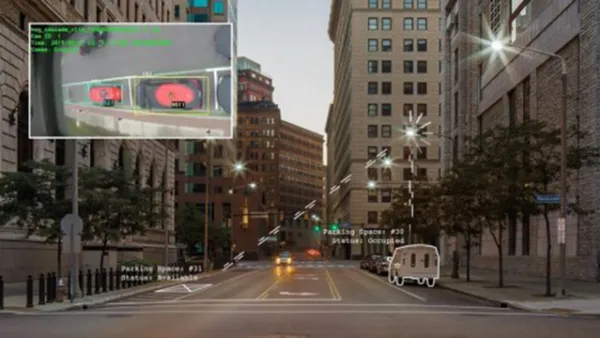In the quest to improve efficiency and effectiveness, "smart" technologies are helping cities become more intelligent machines. But a growing chorus fears the side effects of increased privatization, surveillance, and technological sophistication.
"The smart city has become a buzzword in urban planning and university engineering departments, and a topic of breathless coverage in science and business magazines," says Courtney Humphries. "Although today the vision exists more in the realm of promise than reality, cities such as Boston have begun to invest time and chunks of their budget to laying the groundwork."
"But as political leaders, engineers, and environmentalists join the smart-city bandwagon, a growing chorus of thinkers from social sciences, architecture, urban planning, and design are starting to sound a note of caution. Building a new, intelligent urban infrastructure could be every bit as momentous as building a water supply, or roads, or a subway system—setting development patterns for decades. Though they share enthusiasm for what a smart city could do, they also point out that smart-city programs could—with little public oversight—put us on track to a kind of urban future that not everyone thinks is ideal."
What's at stake may be the soul of the city itself: the Platonic ideal of the "the orderly, manageable city" versus the "chaotic and dynamic whirl of activity."
FULL STORY: The too-smart city

National Parks Layoffs Will Cause Communities to Lose Billions
Thousands of essential park workers were laid off this week, just before the busy spring break season.

Retro-silient?: America’s First “Eco-burb,” The Woodlands Turns 50
A master-planned community north of Houston offers lessons on green infrastructure and resilient design, but falls short of its founder’s lofty affordability and walkability goals.

Delivering for America Plan Will Downgrade Mail Service in at Least 49.5 Percent of Zip Codes
Republican and Democrat lawmakers criticize the plan for its disproportionate negative impact on rural communities.

Test News Post 1
This is a summary

Test News Headline 46
Test for the image on the front page.

Balancing Bombs and Butterflies: How the National Guard Protects a Rare Species
The National Guard at Fort Indiantown Gap uses GIS technology and land management strategies to balance military training with conservation efforts, ensuring the survival of the rare eastern regal fritillary butterfly.
Urban Design for Planners 1: Software Tools
This six-course series explores essential urban design concepts using open source software and equips planners with the tools they need to participate fully in the urban design process.
Planning for Universal Design
Learn the tools for implementing Universal Design in planning regulations.
EMC Planning Group, Inc.
Planetizen
Planetizen
Mpact (formerly Rail~Volution)
Great Falls Development Authority, Inc.
HUDs Office of Policy Development and Research
NYU Wagner Graduate School of Public Service




























